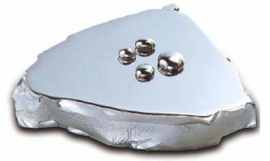Is Metallic Glass metal or glass?
It seems we need to go back to basics and ask ourselves, “What is glass anyway?” The answer is quite shattering. Glass is not just glass, after all.
I like this definition in a post by Girish Kumar on the Conceptual Physics Today site:
There is no universally accepted or universal definition of glass.
Examples of familiar glasses (could be those) made from cane sugar – lollipops and cotton candy. The former are in shape of rigid block and latter are flexible fibres.
Other definitions:
1) An Amorphous solid or glass is one in which long range order is absent and the array of equilibrium atomic positions is strongly disordered.
2) Glass is an un-crystallized solid material.
3) Glass is an inorganic product of fusion which has been cooled to a rigid condition without crystallizing.
4) A general definition including all the aspects of glass is not possible; glass is to be conceived on one hand as a physical chemical condition and on other hand as a technical material.
Then we have Wikipedia’s version:
Glass is an amorphous (non-crystalline) solid material. Glasses are typically brittle and optically transparent.
The most familiar type of glass, used for centuries in windows and drinking vessels, is soda-lime glass, composed of about 75% silica (SiO2) plus sodium oxide (Na2O) from soda ash, lime (CaO), and several minor additives. Often, the term glass is used in a restricted sense to refer to this specific use.
And this (Wikipedia still) is the key to understanding the full meaning of the word:
In science, however, the term glass is usually defined in a much wider sense, including every solid that possesses a non-crystalline (i.e., amorphous) structure and that exhibits a glass transition when heated towards the liquid state. In this wider sense, glasses can be made of quite different classes of materials: metallic alloys, ionic melts, aqueous solutions, molecular liquids, and polymers. For many applications (bottles, eyewear) polymer glasses (acrylic glass, polycarbonate, polyethylene terephthalate) are a lighter alternative to traditional silica glasses.
 Back to Metallic Glass then:
Back to Metallic Glass then:
Well, yes. “It is glass, Jim, but not as we know it.”
If you are interested in the science, this Monash University site may satisfy your appetite: Experiment Reveals Glass Secrets
Me, I’ll stick to glass as I have always known it – for now.
